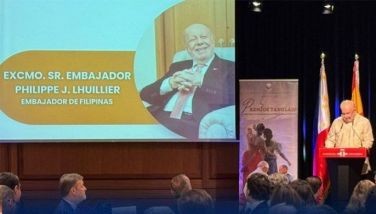In favor of labor

The Philippine Constitution is unequivocal in giving primacy to labor. Article II, Section 18 indubitably mandates that the State “shall protect the rights of workers and promote their welfare.” The Constitution further states in Article XIII, Section 3 that “[t]he State shall afford full protection to labor local and overseas, organized and unorganized.” In the pursuit of economic growth, the State should not lose sight of these constitutional directives.
As an advocate of labor, I am very happy to observe that President Bongbong Marcos has emphasized the responsibility of the State to protect labor and promote the welfare of workers. His first orders to Department of Labor Secretary Laguesma was “to take care of our workers, to ensure better labor conditions for the country’s workforce.”
Indeed the President has a heart for the Filipino workers – whether those working in the Philippines or overseas. This was again evident during his last visit to Thailand to attend the Asia Pacific Economic Cooperation Summit where he met with Saudi Crown Prince Mohammed bin Salman to discuss with him, among other things, the plight of about 10,000 overseas workers who were not paid their salaries because the construction companies they had been working for had gone bankrupt sometime in 2015 to 2016. It was during this meeting where it was announced that the Saudi Arabian government will allocate 2 billion riyals or P30.5 billion for the unpaid salaries of the Filipino workers. Furthermore, the Saudi Arabian Minister of Human Resource and Social Development also assured the President that measures have been taken to prevent a repeat of unpaid wages due to bankruptcy of the employer.
This is indeed very good news. The executive branch is doing its part to fulfill the constitutional directive and there are also many laws to protect labor, but we are still far from achieving the ideal of giving full protection to labor.
On the part of the Supreme Court, they have consistently upheld Article 1702 of the Civil Code and Article 4 of the Labor Code that any doubts in the interpretation of labor laws or contracts should be resolved in favor of labor. This preference is necessary because of the clear difference in power between an employer and an employee. The State must always be vigilant against abuses and ensure that an employer’s exercise of its powers – particularly in its most extreme forms, such as termination – must be for justifiable reasons and with recourse to the proper procedure. Otherwise, an employer would be able to punish an employee disproportionally and inequitably.
In the recent case of Celis vs. Bank of Makati (GR No. 250776) promulgated in June 2022, the Supreme Court ruled that the failure to declare one’s past employment is not just cause to terminate one’s current employment. In the case of Celis, petitioner was hired by the bank and subsequently served there for more than four years. The bank then found out that the petitioner had not divulged a previous employment at another bank, and that while there she was supposedly “involved” in a case concerning embezzlement of funds. Petitioner claimed that the omission was inadvertent and denied involvement in embezzlement. Records also show that she was never held administratively or criminally liable.
Nevertheless, the bank fired her for violation of the Bank’s Code of Conduct and Discipline by “[k]nowingly giving false or misleading information in applications for employment as a result of which employment is secured” and Serious Misconduct, Fraud or Willful Breach of Trust and Loss of Confidence under Article 297 [282] of the Labor Code.
The petitioner filed a complaint for dismissal, which was granted by the Labor Arbiter (LA) and upheld by the National Labor Relations Commission (NLRC). The LA emphasized that the petitioner was never found administratively guilty of embezzlement, nor criminally convicted. Neither did the LA find the failure to disclose the prior employment to be a serious enough offense to warrant termination.
The Court of Appeals (CA), however, ruled against the petitioner and stated that the failure to give information was the same as “[k]nowingly giving false or misleading information in applications for employment.” It also applied the Principle of Totality of Infractions, which asserts that offenses committed by an employee should not be taken singly and separately but in their totality.
The Supreme Court reversed the CA decision and rejected the applicability of the Principle of Totality of Infractions, stating that “[p]revious offenses may be used to aggravate a subsequent infraction to justify an employee’s dismissal only if they are related to the subsequent offense upon which termination is decreed.” In this case, the employer was seeking to dismiss the petitioner in part because her omission of her previous employment was compounded by other offenses such as “acts of disrespect” and “borrowing from the bank’s clients” – but these have no relation at all to a failure to declare a previous employment.
And such a failure could not even be truly seen as a violation of the Code of Conduct. Primordially, the SC emphasized that doubts should be resolved in favor of labor. The provision of the Code of Conduct used the phrase “knowingly giving” and without any clarification to the contrary, the provision should thus only be limited to overt or positive acts, not omissions. To be clear, there is no law or regulation requiring that a prospective employee provide their full employment history to their employer.
Employment history may have been relevant in the decision to hire the petitioner – but by the time the omission was brought up, she had already been working with her current employer for more than four years, and she had performed her work adequately enough. As the SC put it, after almost five years of employment, the omission of employment history was already water under the bridge.
In the end, because of the strained relations between the petitioner and the employer, the SC awarded her separation pay rather than reinstatement. The case is an example of how the structure of the law can give protection to labor, and the need for such protection in order to balance out the power of employers over those that work for them.
I am glad President Marcos has been firm in fulfilling the constitutional mandate to afford full protection to labor. It is essential in achieving a more equitable distribution of opportunities, income and wealth; a sustained increase in the goods and services produced by the country and an expanding productivity to raise the quality of life for all, especially the underprivileged.
- Latest
- Trending
























